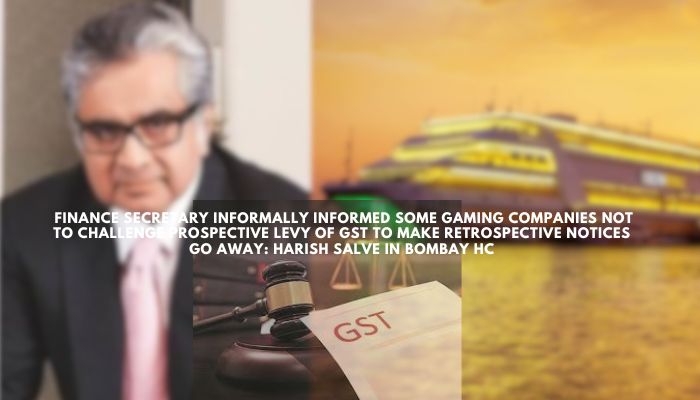
The Indian gaming industry has found itself in the midst of a tax controversy that recently came to light during a hearing in the Bombay High Court. Renowned senior advocate Harish Salve, representing gaming companies like Delta Corp Limited, revealed a crucial piece of information. He disclosed that some gaming companies had informally been urged by the Finance Secretary not to challenge the prospective imposition of the Goods and Services Tax (GST) on their operations. This informal communication was accompanied by a promise that, in return, retrospective tax notices would be waived.
| Table of Contents |
|---|
| 1. Introduction |
| 2. Background Information |
| 3. Legal Challenges Faced by Gaming Companies |
| 4. Harish Salve's Statement |
| 5. GST Council's Changes |
| 6. Implications of the Finance Secretary's Statement |
| 7. The Future of Gaming Industry Taxation |
| 8. Conclusion |
Background Information:
Before delving into the implications of this revelation, let's establish some context. GST, or Goods and Services Tax, is a comprehensive indirect tax imposed on the supply of goods and services in India. The gaming industry, comprising online real-money gaming and casinos, has been at the center of a taxation debate.
Legal Challenges Faced by Gaming Companies:
Gaming companies, including Delta Corp Limited and its subsidiaries, have been grappling with the impending imposition of a 28% GST on deposits or chip purchases. This has resulted in the issuance of showcause notices by the GST department, claiming taxes on the full face value of bets or entry fees, dated back to 2017-22. The sheer magnitude of these notices, totaling over Rs. 2.50 lakh crores, significantly surpasses the reported turnover of these companies for that period.

Harish Salve's Statement:
During his appearance in the Bombay High Court, Harish Salve brought to light the informal communication between the Finance Secretary and some gaming companies. This revelation has raised eyebrows and led to speculation about the motives behind such communication.
GST Council's Changes:
In a bid to address concerns within the gaming industry, the GST Council convened and implemented changes. These changes involved shifting the focus of taxation from Gross Gaming Revenue (GGR) to a 28% tax on the initial deposit made in the online gaming wallet or the purchase of casino chips or tokens. The Council also clarified that winnings redeployed for playing future games or contests would not be subject to GST.
Implications of the Finance Secretary's Statement:
Harish Salve's disclosure of the Finance Secretary's informal communication with gaming companies has raised questions about the legal footing of the showcause notices issued by the GST department. The government's promise to make retrospective GST notices disappear indicates potential vulnerabilities in the department's legal position.
The Future of Gaming Industry Taxation:
As the legal challenges regarding the show cause notices progress, the outcomes will be closely watched by the gaming industry. The implications of these cases are likely to extend beyond the companies directly involved and could significantly impact the way taxation is applied to online gaming and casino activities in India.
(FAQ)
1. What is the Goods and Services Tax (GST), and how does it affect the gaming industry in India?
2. Who is Harish Salve, and what did he reveal in the Bombay High Court?
3. What legal challenges are gaming companies facing in relation to GST?
4. What changes did the GST Council make to address concerns within the gaming industry?
5. What are the potential implications of the Finance Secretary's informal communication with gaming companies?
6. How might the legal challenges in the gaming industry impact the taxation of online gaming and casinos in India?
7. What is the significance of the Rs. 2.50 lakh crore in showcause notices mentioned in the article?
8. Why is this gaming industry taxation issue important, and who is affected by it?
9. What are the key concerns raised by gaming companies regarding the calculation of tax?
10. How is the gaming industry and its stakeholders responding to these developments? - The gaming industry and its stakeholders are closely following the legal challenges and developments, as the outcomes may significantly reshape the taxation landscape for gaming companies in India.
Conclusion:
The gaming industry's ongoing battle with the prospective imposition of GST, as revealed by Harish Salve in the Bombay High Court, is a development with wide-reaching implications. The industry and its stakeholders are awaiting the resolution of these legal challenges, which could reshape the taxation landscape for gaming companies in India.
I'm Supriya Dutt, and I'm not just a blogger; I'm a storyteller with an unending love for Bihar. Bihar is not just my home; it's my muse. I was born and raised in the heart of this culturally rich state, and that's where my journey as a writer began.My passion is to share the beauty and depth of Bihar through my words. Bihar isn't just a place; it's a treasure trove of history, traditions, and untapped potential. Through my blog, BiharLinks.com, I aim to change perceptions and uncover the hidden gems of Bihar.
Ever find yourself staring at your computer screen a good consulting slogan to come to mind? Oftentimes.
